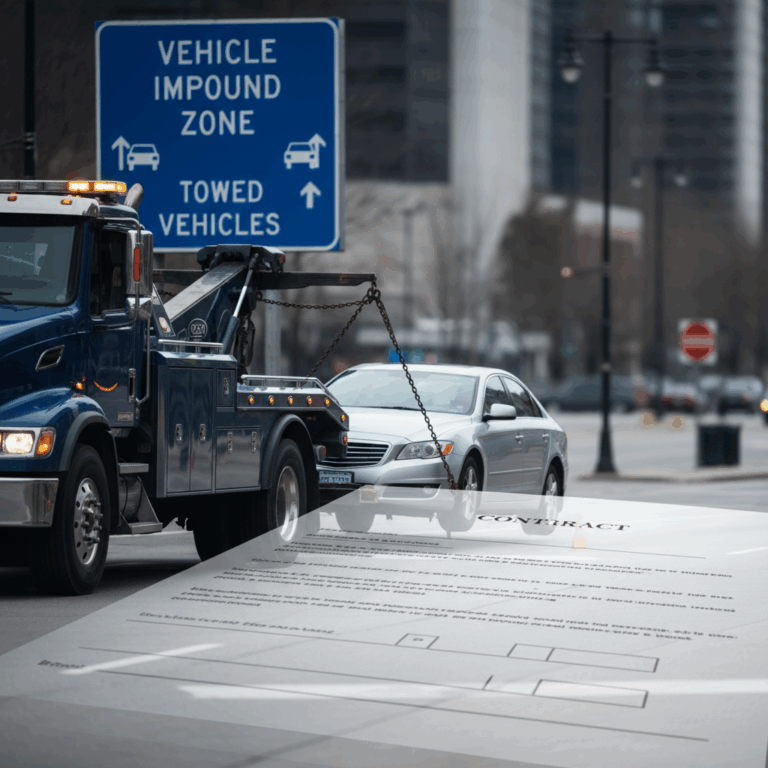Basics of Vehicle Towing and Repossession Laws
Understanding the laws governing vehicle towing and repossession is essential for both towing operators and vehicle owners. These regulations differ widely by location but generally cover licensing and safety standards.
These laws aim to protect consumers and towing businesses by ensuring proper procedures are followed during vehicle recovery. Knowing them can help avoid disputes and legal issues for all parties involved.
The key areas include licensing requirements, operational standards, and protections that safeguard vehicle owners’ rights throughout the towing or repossession process.
Licensing and Permits for Towing Operators
Towing operators must obtain specific licenses and permits to legally provide their services. These credentials ensure that the company meets safety and operational standards required by law.
Licensing often involves demonstrating proper training, equipping vehicles with required safety gear, and adhering to local regulations regarding fees and service protocols.
Failure to comply with licensing laws can result in fines, business closure, or invalidation of tow contracts, making compliance fundamental for operators.
Consumer Protections in Towing and Repossession
Consumer protection laws safeguard vehicle owners against unfair towing and repossession practices by enforcing transparency and fairness in the process.
These protections may include the right to inspect the vehicle before release, the ability to dispute charges, and clear disclosures of fees and procedures involved in towing or repossession.
They serve to balance the interests of vehicle owners and towing companies, ensuring a fair resolution and preventing abusive or deceptive conduct.
Towing Regulations in Spain
Spain has specific regulations for towing that depend on the type and weight of the trailer. These rules ensure safety and legal compliance for both drivers and towing companies.
Understanding these regulations is crucial for motorists who use trailers, as well as for professionals involved in towing and vehicle recovery services.
Requirements for Light and Heavy Trailers
In Spain, light trailers with a maximum authorized mass of up to 750 kg do not require a separate license plate or insurance, simplifying their use with passenger vehicles.
Heavy trailers, however, must have their own registration plate and specific insurance coverage, reflecting their increased risk and regulatory demands.
This distinction helps regulate road safety and ensures that heavier trailers meet stricter control measures to prevent accidents or legal issues.
Driver License Categories for Towing
Driver licenses in Spain vary depending on the combined weight of the towing vehicle and the trailer. The standard category B license covers certain lighter trailers.
For combinations exceeding 4250 kg, drivers must hold a B+E license, which authorizes towing heavy trailers safely under the law’s provisions.
Acquiring the appropriate license ensures that drivers are trained to handle towing dynamics, reducing the risk of accidents on Spanish roads.
Vehicle Registration and Insurance Obligations
Trailers over 750 kg require separate registration and mandatory insurance in Spain. This coverage protects against damages and liabilities during towing operations.
Owners must ensure their trailers comply with these registration and insurance rules to avoid fines and guarantee lawful use on public roads.
These obligations underline the importance of legal responsibility and road safety in the Spanish towing framework.
Towing Laws in the United States
The United States has strict regulations governing towing companies to protect consumers and ensure safe operations. These laws vary by state but commonly include licensing and operational standards.
Towing laws set clear guidelines for companies, including required permits, fee limits, and procedural rules to maintain transparency and fairness during towing and repossession activities.
Licensing and Operational Rules for Tow Companies
Towing companies must obtain state-issued licenses to operate legally. These ensure the company meets safety, insurance, and equipment standards set by law.
Operational rules include maintaining secure storage lots, adhering to maximum fees, and providing clear documentation to vehicle owners after a tow.
Strict compliance prevents illegal towing and helps avoid disputes, protecting both businesses and vehicle owners from misconduct.
Vehicle Owner Rights During Repossession
Vehicle owners have important rights during repossession. Laws usually grant them access to certain information about the process and their vehicle’s location.
Owners can often inspect the vehicle before release and have options to pay fees by various methods. These protections ensure transparency and fairness.
By enforcing these rights, laws help prevent wrongful repossession and ensure owners are treated respectfully throughout the recovery process.
General Safety and Legal Considerations
Ensuring safety standards for towed vehicles is essential to protect both operators and other road users. Proper compliance reduces accidents caused by inadequate equipment or procedures.
Legal measures also play a key role in preventing disputes between towing companies and vehicle owners, fostering a clear framework for resolving conflicts fairly.
Safety Standards for Towed Vehicles
Vehicles being towed must meet specific safety standards, such as proper brake connections and secure hitching, to prevent accidents during transit. These standards vary by country and type of trailer.
Operators must regularly inspect towing equipment to ensure it is in good condition, minimizing risks related to mechanical failure or improper attachment while on the road.
Additionally, lighting and signaling devices on the towed vehicle should comply with legal requirements to maintain visibility and communicate intentions to other drivers.
Adhering to these safety protocols protects not only the towed vehicle and driver but also other motorists sharing the road.
Legal Measures to Prevent Conflicts
Clear regulations define the rights and responsibilities of both towing companies and vehicle owners to reduce potential conflicts during towing or repossession events.
These laws often include obligations for towing operators to notify vehicle owners promptly and set transparent fee structures to avoid misunderstandings.
Dispute resolution mechanisms, such as required documentation and appeal processes, help address grievances efficiently and fairly for all parties involved.
Interesting Insight
Some jurisdictions mandate that towing companies provide itemized receipts and allow vehicle inspections before release, promoting transparency and trust.
This approach is designed to prevent fraudulent charges and ensure owners are fully informed about the status and costs related to their vehicle’s tow.







